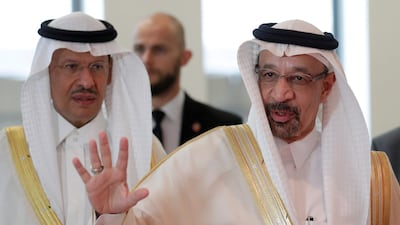Saudi Arabia, the world's biggest oil exporter, does not plan to impose an embargo similar to a previous action in 1973 and is concerned about limited spare oil capacity to cope with disruptions, the kingdom's oil minister said.
Saudi Arabia, along with fellow members of the Organisation of Arab Petroleum Exporting Countries, used oil as a political tool against countries supportive of Israel during the 1973 Yom Kippur War by restricting supplies of crude, a move that caused prices to rise.
Concerns over Saudi-led Opec employing a similar strategy is rattling the oil markets following the death of Saudi journalist Jamal Khashoggi in the kingdom's consulate in Istanbul this month. This comes amid international pressure to consider applying sanctions against Riyadh over questions associated with the journalist's disappearance.
“There is no intention,” Khalid Al Falih told Russia’s state-backed Tass news agency, when asked about a repetition of the 1973 oil embargo.
"Saudi Arabia is a very responsible country, for decades we used our oil policy as a responsible economic tool and isolated it from politics," he said, in response to a question over concerns the kingdom could consider removing 500,000 barrels per day of crude from the markets.
The minister said he remained concerned about dwindling spare capacities within Opec and other producing sovereign states. Saudi Arabia had 1.3 million bpd of spare capacity, with 200,000 bpd in the UAE, which holds the current presidency of the exporters' group.
“So it may happen that we may not need to use spare capacities. But if you have other countries to decline in addition to the full application of Iran sanctions, then we will be pulling all spare capacities,” said Mr Al Falih.
Saudi Arabia is currently producing 10.7 million bpd, after increasing output from 9.9 and 9.8 million bpd in April and May, following the reversal of an agreement to draw down global oil inventories that had earlier led to a three-year price slump. The kingdom accounts for about 12.9 per cent of global crude output.
The oil chief also clarified that any listing of state oil company Saudi Aramco would take place in the kingdom and "another friendly, safe jurisdiction".
The oil producer had issued a statement last month stating the listing would take place at an opportune time, without confirming reports that the sale had been postponed indefinitely.
_______________
Read more:
Saudi Aramco signs preliminary agreement for stake in Chinese refinery
Chinese city in talks with Exxon for $7bn petchems plant
Sabic signs agreement for large petchems complex in China
_______________
For the company to be ripe for listing in the future, Aramco would have to balance weightage of its downstream assets against current upstream assets in its portfolio, he added.
“Aramco is the world’s largest upstream company with the production of around 14 million bpd of oil equivalent – oil and gas,” said Mr Al Falih. “Our petrochemical portfolio is also not so large, and is not so strong in terms of technology and global reach. So the decision was made that Aramco needs to balance its portfolio, such that it also gives us more revenues from the downstream.”
Aramco is currently in the process of acquiring a stake in Sabic, Saudi Arabia’s largest listed company and the region’s largest petchems producer.
Mr Al Falih said the acquisition of 70 per cent of Sabic, in which the kingdom’s sovereign Public Investment Fund holds a stake, would take at least 18 months, due to sourcing of regulatory approvals from international anti-trust agencies.
"We are looking at 2021 as potentially the year of IPO. If all goes well, IPO will be more successful in 2021 compared to 2018," he said. Mr Al Falih also confirmed interest of Russia's Sibur in a joint venture in Aramco's existing partnership with Total to develop petchems capacities in the kingdom's Jubail Industrial City.
Following the start-up of the Arctic Yamal project in Russia, Saudi Arabia was still keen to develop a second liquefied natural gas project in the region, he added.
“Early indications are positive, reserves are there. We expressed interest, now what we have to do is to agree on the terms and negotiate them with Novatek,” said Mr Al Falih.
Novatek is the company that controls Yamal LNG in which France’s Total along with China’s CNPC and the Silk Road Fund are minority shareholders.


